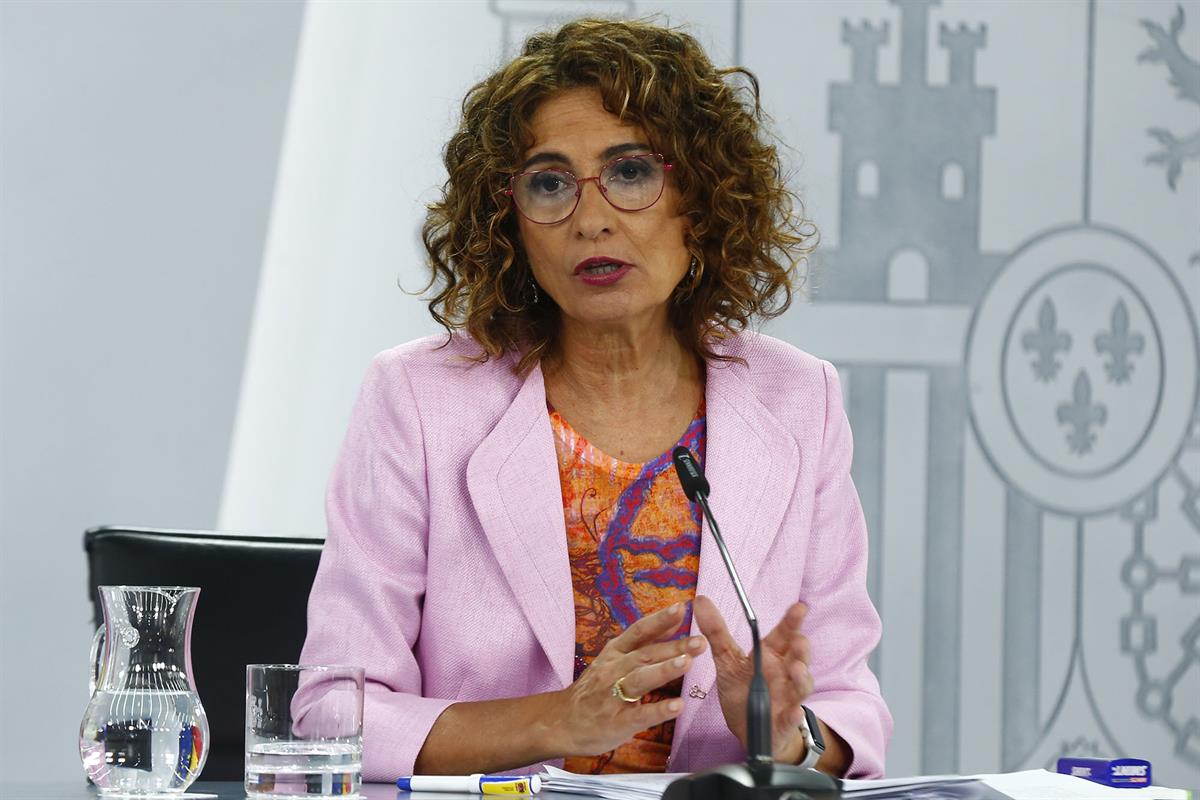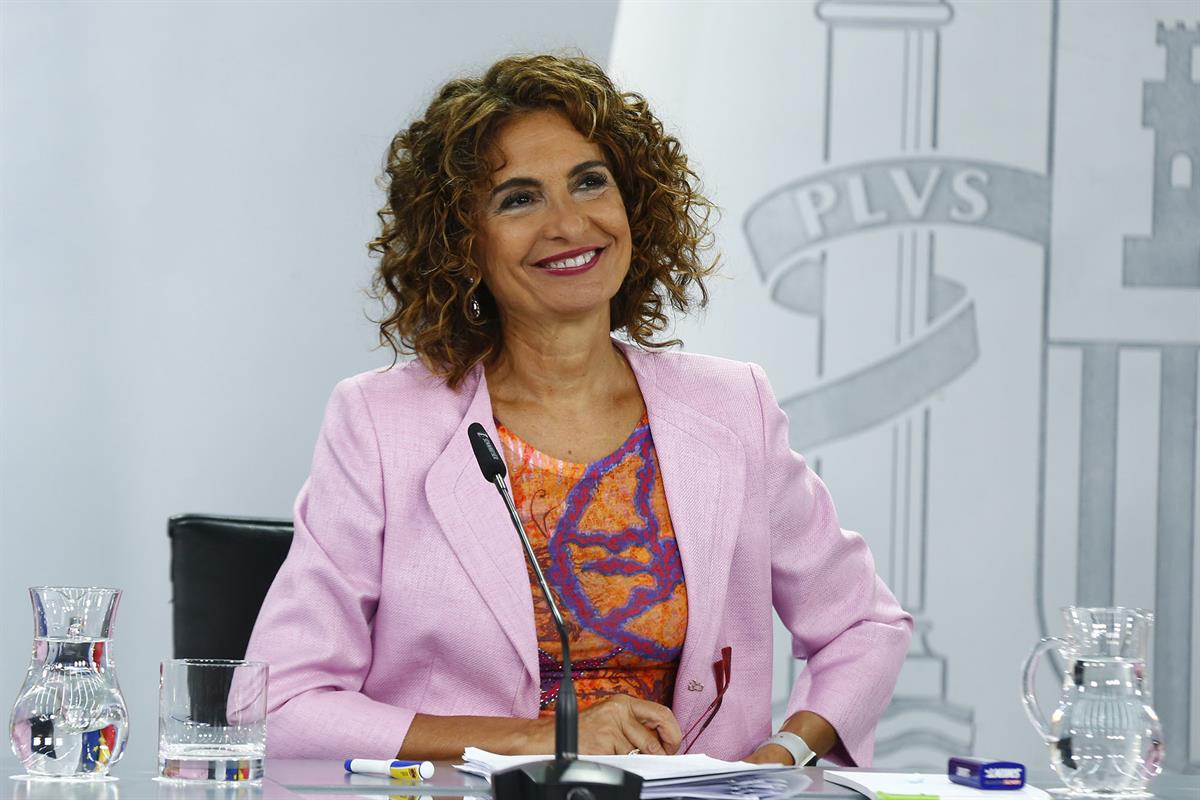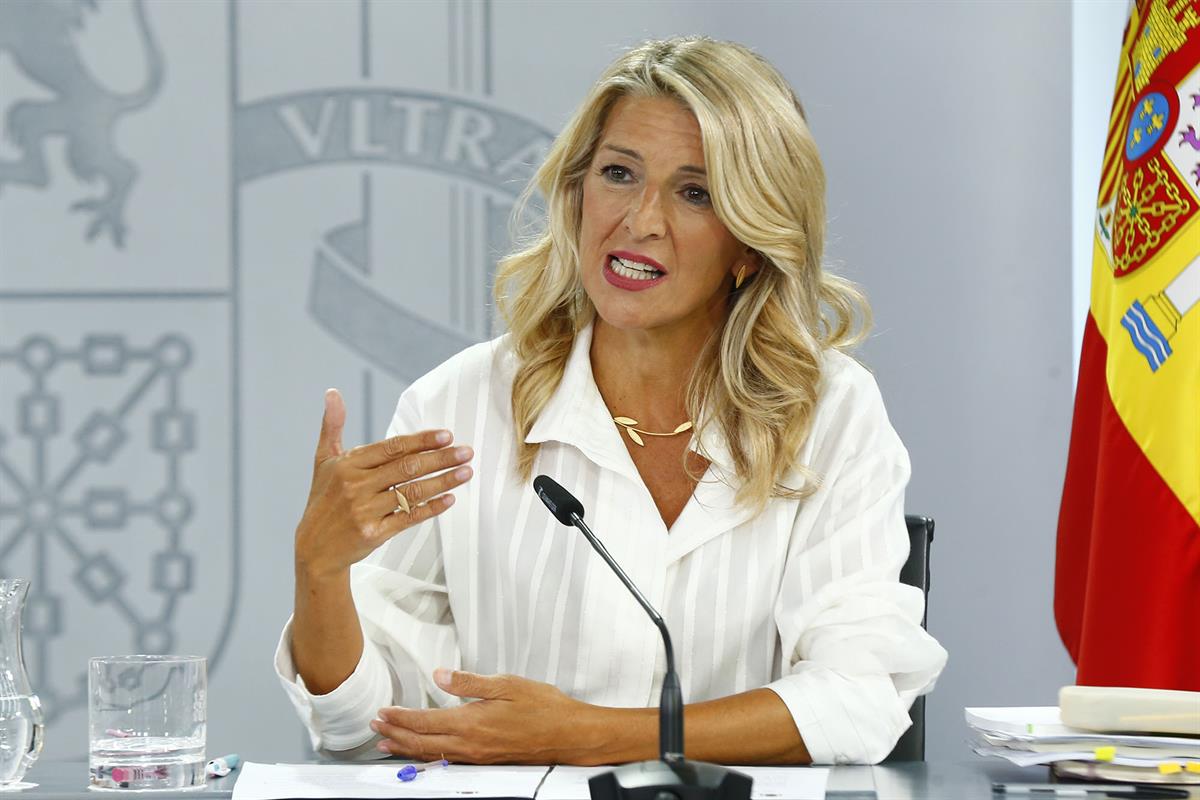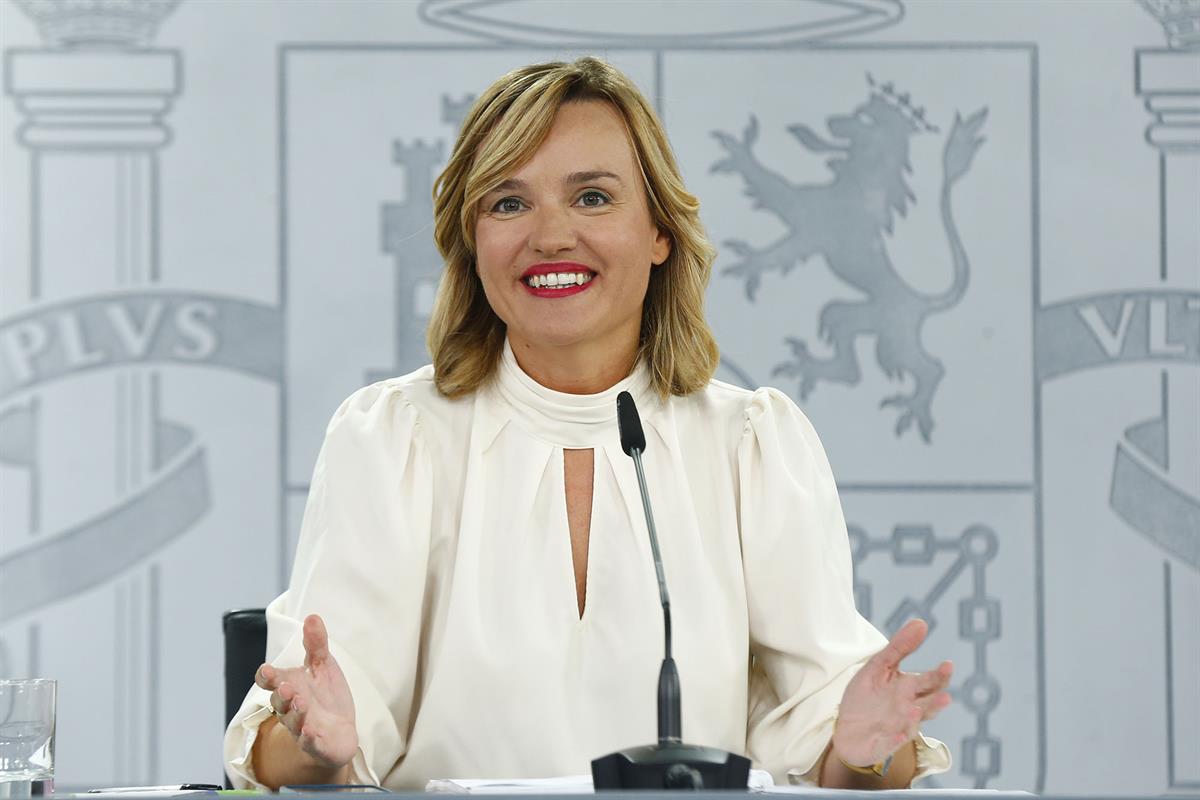Council of Ministers
The Government of Spain approves a stability path that fuses fiscal rigour and the strengthening of public services
Council of Ministers - 2024.9.10
Moncloa Palace, Madrid
 The First Vice-President and Minister for Treasury, María Jesús Montero, the Minister for Education and Government Spokesperson, Pilar Alegría, and the Second Vice-President and Minister for Work and Social Economy, Yolanda Díaz (Pool Moncloa/José Manuel Álvarez)
The First Vice-President and Minister for Treasury, María Jesús Montero, the Minister for Education and Government Spokesperson, Pilar Alegría, and the Second Vice-President and Minister for Work and Social Economy, Yolanda Díaz (Pool Moncloa/José Manuel Álvarez)
The Council of Ministers has approved the stability and public debt targets for the public administrations for the period 2025-2027, and has set the expenditure ceiling for this year.
The First Vice-President of the Government and Minister for Treasury, María Jesús Montero, explained that this is the very stability path the executive agreed on 16 July last year, and which the Lower House of Parliament did not subsequently endorse. In compliance with the Budgetary Stability Law, the Government is sending the objectives back to parliament "because we are still committed to the autonomous communities and local councils", said Montero.
The new path includes less demanding deficit targets for the autonomous communities and local entities than those of the current path, so that they can allocate the additional resources to services such as health, education and dependency. According to María Jesús Montero, this wider margin corresponds to lower spending by the state administration: "We are redoubling our effort so that we can preserve the welfare state, which is provided mainly by the autonomous communities and local councils".
Fiscal consolidation and strengthening the welfare state
The first vice-president stressed that this path is also compatible with reducing the public deficit and fiscal consolidation, along the lines followed in recent years. "The figures confirm that the economy in our country is doing very well and that the policy this Government has been implementing is moving in the right direction", Montero assured.
 The First Vice-President of the Government of Spain and Minister for Treasury, María Jesús Montero, during her speech at the press conference after the Council of Ministers | Pool Moncloa/José Manuel Álvarez
The First Vice-President of the Government of Spain and Minister for Treasury, María Jesús Montero, during her speech at the press conference after the Council of Ministers | Pool Moncloa/José Manuel Álvarez
The vice-president stressed that the Spanish economy grew five times more than the EU average last year, and that this year and next year it will continue to expand well above the average for the euro area, according to forecasts by all organisations. In terms of employment, there are 2.2 million more jobs than in 2018 and, following the approval of the labour reform, 3.4 million more workers enjoy permanent contracts. Moreover, the Government's measures against price increases have meant that inflation is at 2.2%, the lowest level in 14 months.
The finance minister also pointed out that the public deficit has been reduced by €60 billion from the pre-pandemic maximum, "without applying cuts to the welfare state, but on the contrary, by boosting and strengthening public services". Montero said that his "prudent fiscal policy" has been endorsed by the European Commission, as demonstrated by the fact that Spain has not been included in the excessive deficit procedure, having a lower deficit than countries such as France and Italy.
More fiscal space for autonomous communities and local councils
The finance minister reiterated the Government's commitment to continue working "to provide solutions and demonstrate the usefulness of politics". With this goal, the stability path approved today continues with the reduction of the general government deficit as a whole -standing at 3% this year and falling to 1.8% in 2027- while widening the fiscal margin of the autonomous communities and local councils so that they can strengthen the services they provide to citizens.
Specifically, the path that is now being submitted to parliament grants two tenths of a percentage point more fiscal margin to the autonomous communities in 2025 and 2026, giving these administrations some €3.3 billion more spending capacity in each budget year. In the case of local authorities, the new path means one tenth and two tenths of a percentage point more in 2025 and 2026, respectively, i.e. around 1.6 billion and 3.35 billion more margin. If the path is not approved, these administrations will have a total of some 11.55 billion less over the next two years.
The presentation of the PGE, the next step on the roadmap
 The First Vice-President of the Government of Spain and Minister for Treasury, María Jesús Montero, at the press conference after the Council of Ministers | Pool Moncloa/José Manuel Álvarez
The First Vice-President of the Government of Spain and Minister for Treasury, María Jesús Montero, at the press conference after the Council of Ministers | Pool Moncloa/José Manuel Álvarez
The first vice-president stressed that the Government is going to present the draft General State Budget for 2025 with the stability path established today, and if it is not approved in parliament then with the previous one, which offers the communities and local councils less spending capacity. The goal of these public accounts will be "to continue making progress in fiscal consolidation, promoting solid economic growth and strengthening the welfare state with the aim of reducing inequalities", Montero indicated.
The Council of Ministers has set the 2025 non-financial expenditure limit, known as the 'expenditure ceiling', at €195.35 billion, excluding European funds. The increase compared to 2024 is 3.2%, or almost €6.14 billion. If European funds are included, the expenditure ceiling stands at €199.17 billion, almost the same as in 2024, due to the decrease in direct transfers from the Recovery, Transformation and Resilience Plan as individual programmes are implemented.
María Jesús Montero stated that the draft general budget will be presented once the public accounts have been discussed with the ministries and political forces that make up the coalition Government, and the Government will enter into dialogue with the political groups to seek their support.
More rights for domestic workers
The Second Vice-President and Minister for Work and Social Economy, Yolanda Díaz, informed that the Council of Ministers has regulated health and safety protection in the field of family home services.
Díaz detailed that domestic workers will be given new rights. Employers will provide them with equipment appropriate to the work they perform. They will be guaranteed the right to free continuous training during their working time where possible, and if not, they will be compensated with rest time. They will also be able to undergo a free medical examination on a voluntary basis.
 The Second Vice-President and Minister for Work and Social Economy, Yolanda Díaz, during her speech at the press conference after the Council of Ministers | Pool Moncloa/José Manuel Álvarez
The Second Vice-President and Minister for Work and Social Economy, Yolanda Díaz, during her speech at the press conference after the Council of Ministers | Pool Moncloa/José Manuel Álvarez
In addition, the Institute for Safety and Health at Work (INSST) will draw up a Technical Guide for the prevention of occupational risks, and will set a protocol on harassment and domestic violence available to women workers.
Home help workers will have the same rights to protect their safety and health, adjusted to their conditions.
Yolanda Díaz reiterated that all these tools will be completely free of charge, meaning zero cost for families because they are provided by public administrations: "We give rights to women workers and security to families".
Spain, at the forefront in occupational risk prevention for domestic workers
The Minister for Work and social economy recalled that the Government is continuing to make progress on rights for all workers, and with the law approved today is dignifying domestic work and giving visibility to a group of 367,900 women "who look after us, form part of our families and until very recently lacked rights".
Díaz stressed that it is a feminist regulation that improves the lives of workers, redresses historical discrimination, and places Spain at the forefront in the area of occupational risk prevention for domestic workers. "The country's challenge is to move forward in the care society," she added.
The text is the result of dialogue with trade unions and industry representatives and is endorsed by the Council of State.
Modernising and consolidating vocational training
The Council of Ministers has approved a new investment of more than 130 million to complete the I Plan for the Modernisation of Vocational Training.
 The Minister for Education, Vocational Training and Sports and Government Spokesperson, Pilar Alegría, during the press conference after the Council of Ministers | Pool Moncloa/José Manuel Álvarez
The Minister for Education, Vocational Training and Sports and Government Spokesperson, Pilar Alegría, during the press conference after the Council of Ministers | Pool Moncloa/José Manuel Álvarez
The Minister for Education, Vocational Training and Sports and Government Spokesperson, Pilar Alegría, specified that the funds will enable more than 41,000 new vocational training places to be created in the autonomous communities, except for La Rioja and the Balearic Islands, which have rejected the Government's contribution.
Regarding education, the Government has also approved the allocation of almost €26 million to the communities so that they can set up 480 new applied technology classrooms (ATECA classrooms). These are learning spaces where students develop digital skills.
The Government has agreed on the distribution to the communities of €15 million for the accreditation of professional competences for nearly 30,500 people. Alegría pointed out that the professional experience of more than one million workers has already been recognised, and the aim is to reach two million by the end of the legislature.
New places in the first cycle of Pre-school Education
The Council of Ministers has agreed to the redistribution of €32.2 million to the seven autonomous communities that have requested more funds to create free public places for children aged from 0 to 3 years. Aragón, Asturias, Castilla y León, Comunitat Valenciana, Madrid, Murcia and Navarra are the target countries.
The executive's spokesperson explained that 2,900 places will be created with funds reimbursed by the Junta de Andalucía, a community that has expressly rejected the funding of €112 million for free public places for its schoolchildren.
Programmes of social interest
The Government has authorised the distribution of the amount collected in the 0.7% tax allocation from personal income tax and corporate income tax among the autonomous communities and cities (except for the Basque Country and Navarre) to finance programmes of social interest.
Pilar Alegría specified that this amount is €335 million, which means that they will receive 13% more funds than in 2023. The way the funds will be distributed will be approved at a sectoral conference.
Non official translation





